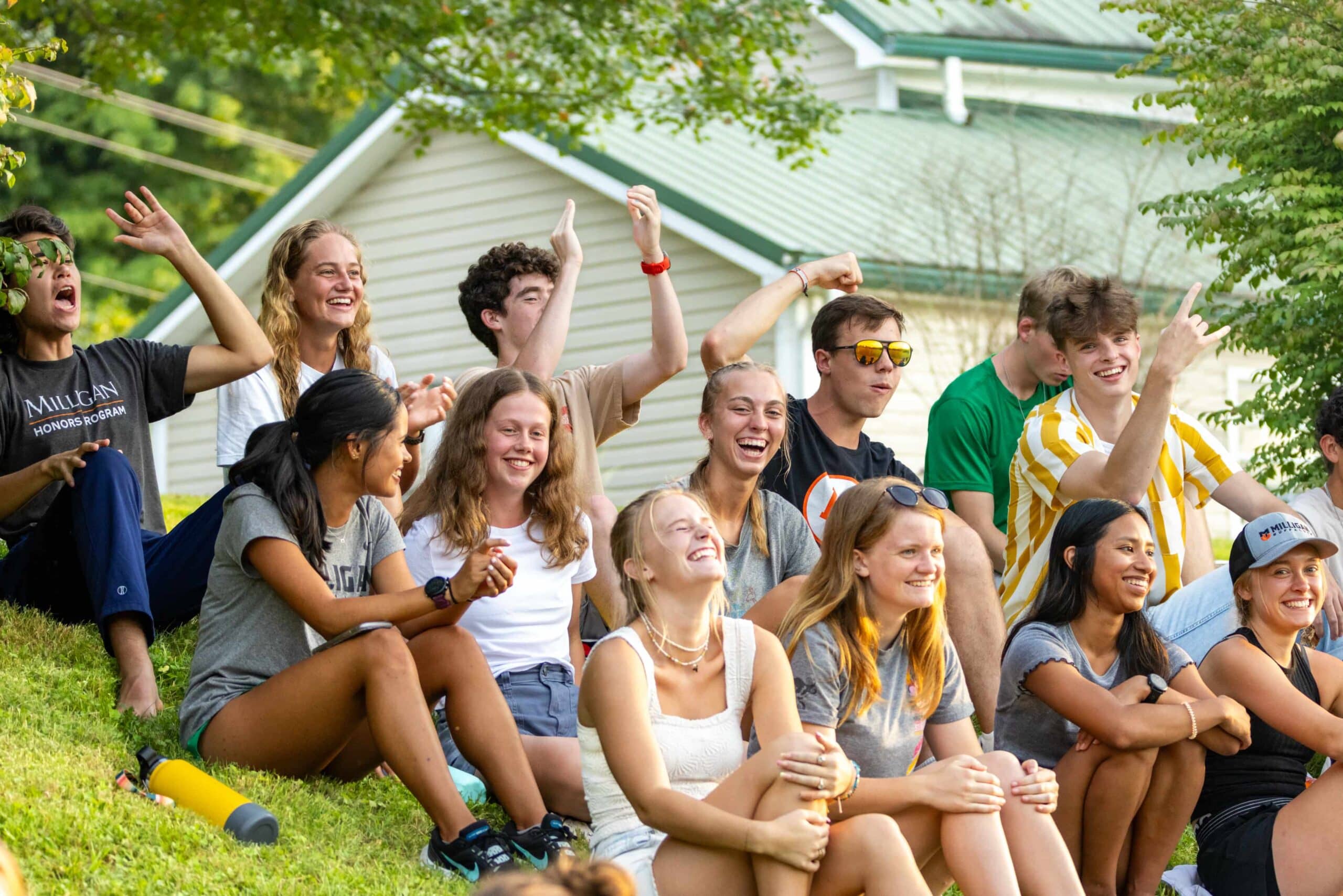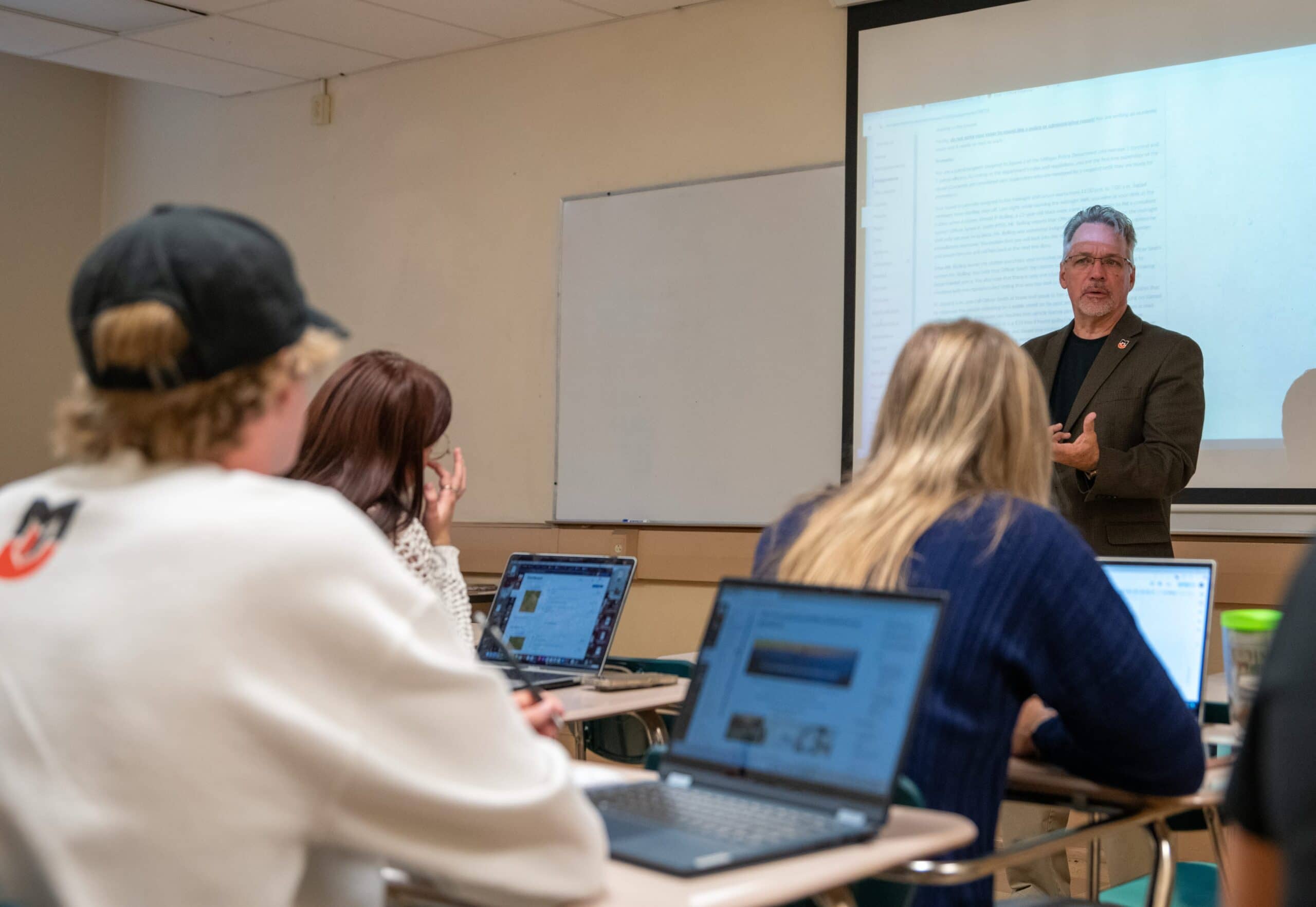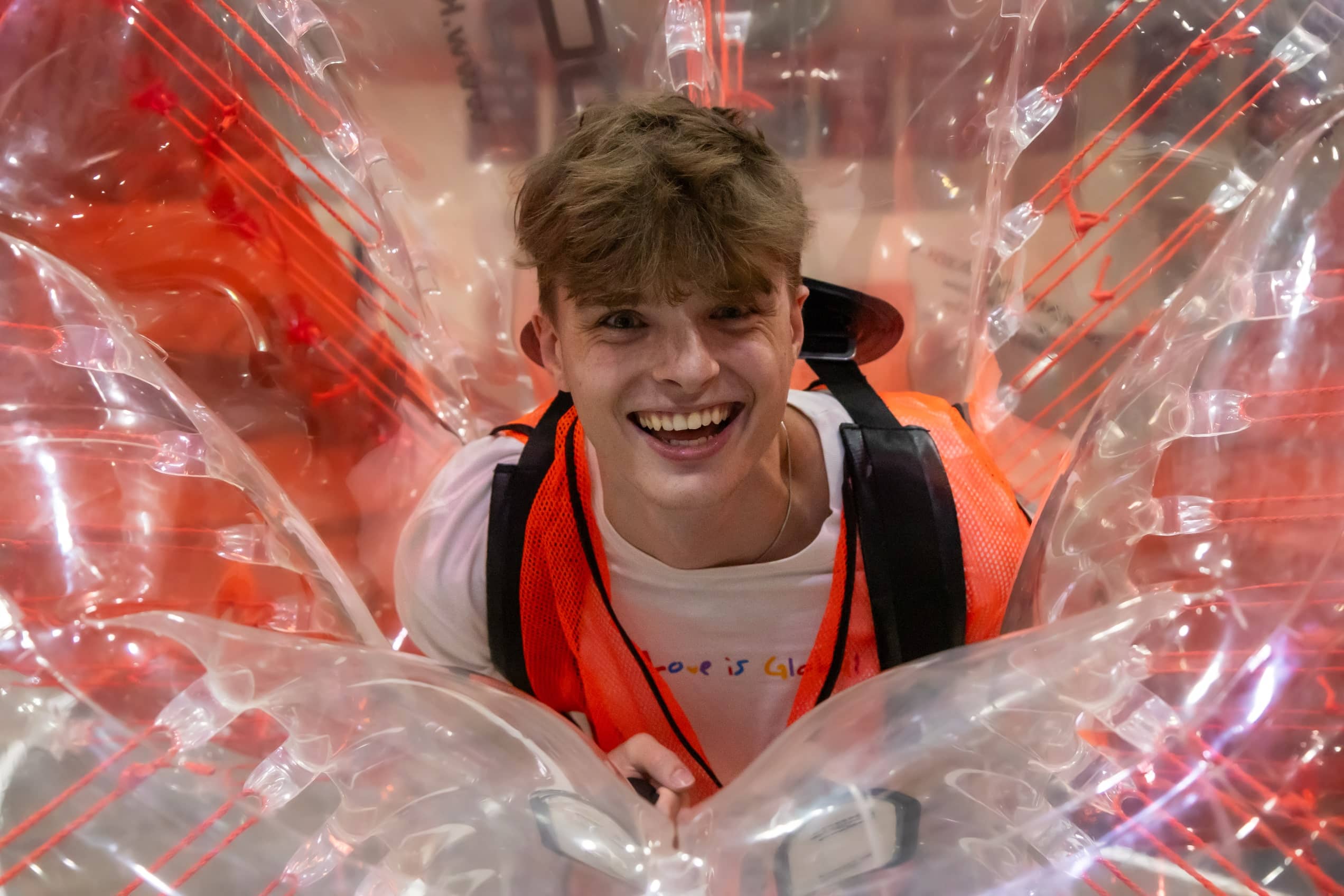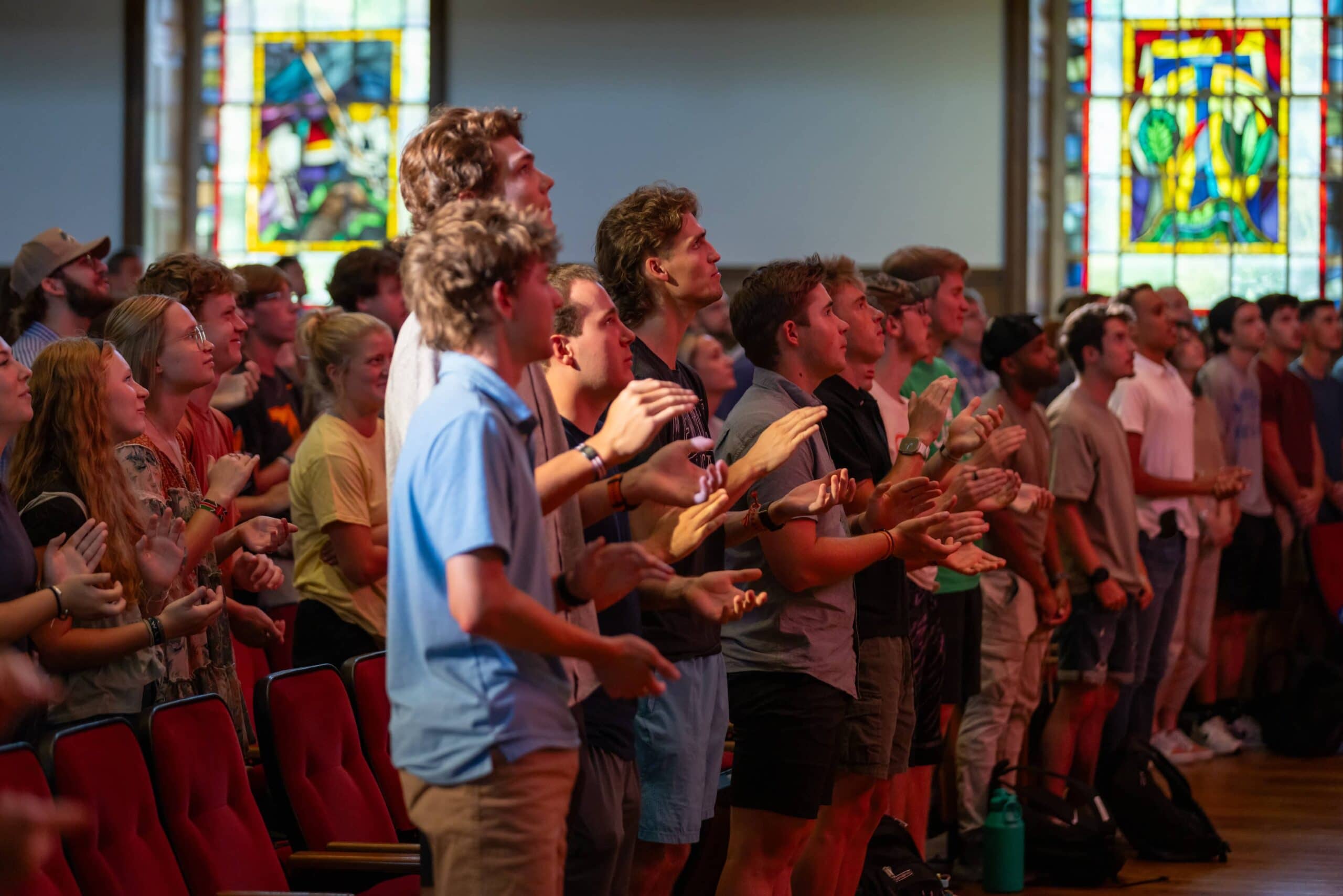Why Choose Milligan University for MSOT?
A Christian worldview guides students to serve others through occupational therapy practice, focusing on hands-on, collaborative learning in the classroom. Faculty bring real-life experiences from diverse clinical areas, enriching the learning process. Students gain practical and creative therapeutic skills through community-based service learning in underserved settings and are carefully selected for fieldwork opportunities across 43 states.
SCHOOL OF SCIENCES & ALLIED HEALTH
MASTER OF SCIENCE IN OCCUPATIONAL THERAPY (MSOT)
Career Paths in Occupational Therapy
Occupational therapy is a fast-growing field with diverse job opportunities in hospitals, schools, and rehabilitation centers. Emerging areas include driver rehab, elderly training, and ergonomic consulting. With an average salary of over $76,000, our graduates enjoy high job placement rates.
Potential Careers
Rehabilitation Therapy
Pediatric Occupational Therapy
Support children to achieve developmental milestones and independence through tailored therapies.
Geriatric Care
Assist older adults in maintaining functional independence and quality of life.
School-Based Therapy
Address student needs in educational settings to enhance learning and participation.
Home Health Care
Deliver therapy in home environments to meet patients’ unique needs.
Workplace Ergonomics
Create efficient, health-conscious workspaces to prevent injury and support productivity.
Curriculum & Schedule
The program is a full-time, two-and-a-half-year program, including fieldwork experiences. Courses meet four days a week (Monday through Thursday). The 79-hour-MSOT curriculum utilizes a developmental course sequence, including three essential components: basic skills, the occupational therapy process (with persons, groups, and populations), and capstone experiences. The program prepares students with a breadth and depth of information for practice as a generalist with broad exposure to current practice settings (e.g., hospital, school, long-term care, community, and out-patient) and emerging practice areas (e.g., health and wellness services, low vision services, psychosocial needs of children and youth, and consulting and home modification). The curriculum prepares students for physical and mental health practice with various populations, including children, youth, adults, and older adults.
The length of the program follows the typical progression and pattern of graduate coursework for entry-level Occupational Therapy education to meet standards for graduate education and the expected outcomes of our graduates. In addition, the length of the program is comparable to other institutions with graduate, entry-level Occupational Therapy programs, ensuring a robust education in health sciences. All students are admitted to the occupational therapy program on a full-time basis. Completion of all degree requirements on a full-time basis will take a minimum of two and one-half years. Students must complete Level II fieldwork within 24 months following completion of the didactic portion of the program.
Developmental Course Sequence
COMPONENT I: BASIC SKILLS
The basic skills component represents the subject matter, which serves as the foundation for professional theories and practice methods. This component includes applied science courses, research methods and design, and an introduction to the profession of occupational therapy.
COMPONENT II: THE OCCUPATIONAL THERAPY PROCESS
The core of this curriculum, the occupational therapy process, includes the study of occupation and therapeutic use of occupation, typical life span development, and health and wellness with the integration of the major theories and practice methods of occupational therapy. A developmental sequence (i.e., from children to older adults) is utilized to facilitate continuity and consistency from one course to another in the Occupational Therapy degree program. Major topics dealing with disease processes, the physical and psychosocial impact of dysfunction, wellness, assessment, intervention, adaptation, and emerging practice areas are incorporated. This sequence of courses promotes the development of resourceful and critical thinking skills in the occupational therapy process with persons, groups, and populations. Self-reflection is facilitated to expand professional and ethical practice and servant leadership. An introduction to clinical experiences through Level I fieldwork is included.
COMPONENT III: CAPSTONE EXPERIENCES
The capstone component of the curriculum is designed to move the student further toward the objective of integrated critical thinking for generalist practice as an entry-level occupational therapist with expertise in the therapeutic use of occupation and therapeutic use of self. Topics covered in these courses include administration and leadership, professional development, directed research, and Level II fieldwork. At the end of this component of the curriculum, the student should be prepared to sit for the NBCOT certification examination for occupational therapists.
Leadership & Practice
Our mission is to prepare occupational therapists as servant-leaders who engage in scholarship, contribute to the profession, and offer clinical expertise to underserved local and global communities. To that end, Milligan’s MSOT program will prepare you with critical thinking and clinical skills to assume leadership roles in clinical practice, administration, research, and education. The program is holistic in nature and integrates theory and practice in the art and science of occupational therapy. Partnerships with regional, state, and national healthcare systems, hospitals, clinics, and non-profit organizations provide a wide range of professional experiences for our MSOT students.
Outcomes
The total number of graduates from the Milligan University Master of Science in Occupational Therapy program during the 3-year period of 2022-2024 was 89, with an overall graduation rate of 99%.
| Graduation Year | Students Entering | Students who withdrew for reason other than academic performance | Students Graduating (within 150% of expected time) |
Graduation Rate* |
| 2022 | 32 | 0 | 32 | 100% |
| 2023 | 32 | 2 | 29 | 97% |
| 2024 | 30 | 2 | 28 | 100% |
| 3-Year Total | 94 | 4 | 89 | 99% |
*Graduation rate does not include students who withdrew for reasons other than academic performance.
As a graduate of our program, you will be eligible to sit for the national certification examination administered by the National Board for Certification in Occupational Therapy (NBCOT), located at One Bank Street, Suite 300, Gaithersburg, MD 20878. NBCOT’s phone number is (301) 990-7979 and its web address is nbcot.org. See our NBCOT Pass Rate. After successful completion of this exam, you will be an Occupational Therapist Registered (OTR).
| Graduation Year | NBCOT New Graduate Pass Rate |
| 2021 | 100% |
| 2022 | 97% |
| 2023 | 98% |
| 2024 | 100% |
Passing the NBCOT Certification Examination for the occupational therapist is necessary, but each state may have additional requirements for state licensure. You can find information about state licensure requirements for those pursuing a degree in occupational therapy here. A felony conviction may affect a graduate’s ability to sit for the NBCOT certification examination or attain state licensure.
Licensure
ACOTE® accredited occupational therapy and occupational therapy assistant educational programs satisfy the state educational requirements of all states, including the District of Columbia and Puerto Rico. Students graduating from an ACOTE® accredited occupational therapy and occupational therapy assistant educational program are eligible to take the National Board for Certification in Occupational Therapy (NBCOT) certification exam and apply for licensure in all states, the District of Columbia, and Puerto Rico. For more information regarding state qualifications and licensure requirements, please refer to the AOTA State Licensure webpage.
Admission
Milligan’s Master of Science in Occupational Therapy (MSOT) program is designed for students who have an earned bachelor’s degree and have completed the prerequisite requirements for admission to the program. Baccalaureate degrees can be in various academic areas, including human performance and exercise science, human relations, development, sociology, biology, and psychology. Milligan’s MSOT program starts one class a year each August. Admission is very competitive in the MSOT program; therefore, it is highly recommended to have your completed application submitted to OTCAS by May 21 for verification. The application must be verified in OTCAS by June 1 in order for the application to be considered for admission.
Application deadlines are as follows:
- October 1
- January 1
- April 1
- June 1.
It is highly recommended that applicants submit applications to OTCAS by September 1 for verification to be eligible for the first round of interviews.
Apply through OTCAS
To apply, submit an online application through OTCAS, an Occupational Therapy centralized application service. The application must be verified in OTCAS in order for the application to be considered for admission.
Early Acceptance Program
Current Milligan undergraduate students may be eligible for the early acceptance program. You may apply as early as your Junior year.
Financial Information
Our MSOT program is priced competitively, and we will work with you individually every step of the way to help investigate all the options available for financing your education. Financial aid is available for graduate students. Ask us how our costs compare to other similar institutions and programs!
CURRENT COSTS
| MSOT | 2025-2026 Academic Year |
2026-2027 Academic Year | 2027 Field Work | Total Cost of Program (2.5 yr. program 2025-2027) |
| Tuition | $29,520 | $27,060 | $8,200 | $64,780 |
| Student Fee | 1,705* | 1,305* | 0 | 3,010* |
| Estimated Books & Supplies | 1,100 | 1,100 | 0 | 2,200 |
| Estimated Loan Fees | 220 | 220 | 110 | 550 |
| Total | $32,545 | $29,685 | $8,310 | $70,540 |
All fees, books, and supplies figures noted above are estimates and subject to change.
*Please note that this figure does not include required liability insurance and background check expenses.
ESTIMATED OFF-CAMPUS LIVING EXPENSES (PER MONTH)
Housing/Food $ 900
Personal Expenses $ 440
Total $1,340
Accreditation
Milligan’s MSOT program is accredited by the Accreditation Council for Occupational Therapy Education (ACOTE) of the American Occupational Therapy Association (AOTA), located at 7501 Wisconsin Avenue, Suite 510E, Bethesda, MD 20814. ACOTE’s telephone number, c/o AOTA, is 301.652.AOTA and its web address is acoteonline.org.

MSOT Faculty
Frequently Asked Questions
What Qualifications Do I Need To Apply for Milligan's Occupational Therapy Master's Program?
Applicants should have a bachelor’s degree from an accredited institution and have completed prerequisite courses in Anatomy, Physiology, and Psychology. A minimum cumulative GPA of 3.0 is required to ensure academic readiness for the certification examination for the occupational therapist. Additionally, applicants must document at least 40 hours of observation in a professional occupational therapy setting to demonstrate familiarity with the field. The application process includes submitting official transcripts, a personal statement, and recommendation letters. Milligan’s admissions team can guide you through the process and answer any specific questions about eligibility. For more details, visit our program admissions page or contact our office for personalized assistance.
Is the Program Accredited, and What Does That Mean for Me?
Yes, Milligan’s Occupational Therapy Master’s program is accredited by the Accreditation Council for Occupational Therapy Education (ACOTE). Accreditation ensures that the program meets rigorous educational standards and prepares students for the National Board for Certification in Occupational Therapy (NBCOT) exam. Graduating from an accredited program is required for state licensure, which allows you to practice as an occupational therapist. This accreditation reflects Milligan’s commitment to providing high-quality education in health sciences and equipping students with the skills and knowledge they need for successful completion of their degree program.
How Long Does It Take To Complete the Program?
Milligan’s Occupational Therapy Master’s program is designed to be completed in two and a half years of full-time study. This time frame includes coursework covering foundational topics like Anatomy, Neuroscience, Therapeutic Methods, and hands-on fieldwork experiences. The schedule is structured to ensure that students develop academic knowledge and practical skills. Graduates leave the program fully prepared to pursue licensure and excel in professional settings. Milligan’s supportive faculty and resources help students stay on track throughout the program.
What Hands-On Experiences Are Part of the Program?
Hands-on learning is vital to Milligan’s Occupational Therapy Master’s program. Students participate in both Level I and Level II fieldwork. Level I offers exposure to various settings, helping students apply classroom knowledge in real-world contexts. Level II involves two 12-week immersive experiences under the supervision of licensed occupational therapists. These fieldwork opportunities allow students to work directly with clients, develop clinical skills, and gain the confidence to transition into professional roles. Milligan partners with diverse healthcare and community organizations to provide meaningful placements.
Are Financial Aid or Scholarships Available?
Yes, Milligan offers a variety of financial aid options, including scholarships, grants, and loans. The financial aid office works closely with students to identify opportunities that align with their needs. Merit-based scholarships are available for qualified applicants, while federal aid programs provide additional support. Students are encouraged to apply early and explore all funding options. Milligan is committed to helping students make their education affordable and accessible. Detailed financial aid information and application guidance are on the university’s website.
What Sets Milligan's Program Apart from Others?
Milligan’s Occupational Therapy Master’s program stands out for its academic excellence and faith-based education integration. Small class sizes allow for personalized attention from experienced faculty, creating a supportive environment for learning. The program emphasizes holistic care, teaching students to consider clients’ physical, emotional, and spiritual needs. Milligan’s close-knit community fosters collaboration and personal growth, while advanced facilities and fieldwork partnerships ensure students receive a comprehensive education in health sciences. Graduates are prepared to serve as compassionate and knowledgeable professionals in the field.
What Career Paths Can I Pursue After Graduating?
Graduates from Milligan’s OT program have diverse career opportunities. These include rehabilitation therapy, pediatric occupational therapy, geriatric care, mental health therapy, school-based therapy, home health care, workplace ergonomics, and hand therapy. Each career path allows professionals to make a meaningful impact in clients’ lives. The program’s strong focus on real-world application ensures graduates are well-prepared to enter these fields confidently and competently.













